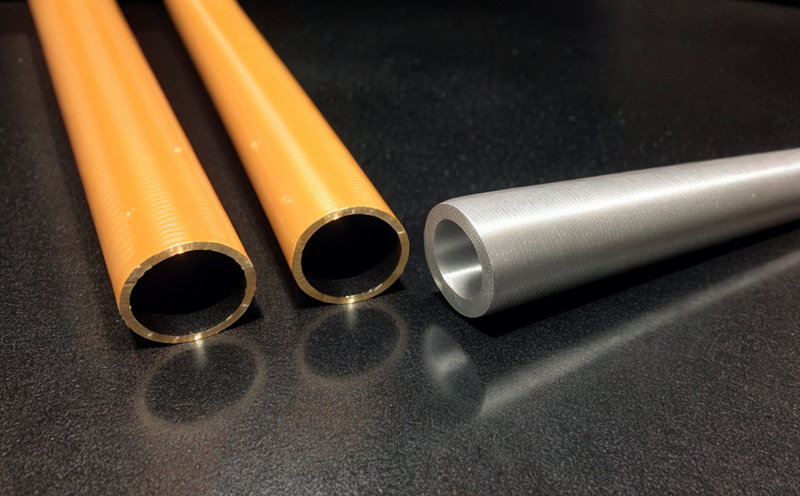ASTM D885 Tensile Testing of High-Performance Yarns
The ASTM D885 standard test method is a critical procedure used in the aerospace and aviation industries for evaluating the tensile properties of high-performance yarns. This testing ensures that materials meet stringent performance requirements, thereby enhancing the reliability and durability of components within aircraft structures.
High-performance yarns are essential components in composite materials employed across various sectors including aerospace, automotive, and sports equipment. These materials must withstand extreme environmental conditions such as temperature fluctuations, humidity, and mechanical stress without compromising their integrity. ASTM D885 provides a standardized approach to measure the tensile strength, elongation at break, and modulus of elasticity under defined testing parameters.
The test involves subjecting specimen pieces cut from actual yarns or composite materials to uniaxial tension until failure occurs. The data collected is used for quality assurance, design optimization, and compliance with industry standards. By adhering strictly to ASTM D885 guidelines, laboratories ensure consistent results that are comparable across different facilities.
The procedure typically begins by selecting appropriate specimens according to the specified dimensions outlined in the standard. Specimens should be free from defects and representative of the actual yarns being tested. Preparing these samples correctly is crucial for accurate test outcomes.
Once prepared, the samples are mounted onto a tensile testing machine equipped with suitable grips capable of handling high loads without introducing additional stress. The machine then applies controlled stretching forces until the sample reaches its breaking point. During this process, critical parameters like load and extension are continuously monitored using precision instruments. These measurements provide detailed insights into how each type of yarn behaves under tension.
After completing a series of tests on multiple samples, analysts compile all gathered data points to determine average values for tensile strength, elongation at break, and modulus of elasticity. Compliance with ASTM D885 specifies acceptance criteria based on these calculated averages rather than individual readings. Meeting these standards guarantees that the tested yarns meet specified performance levels required by end-users like aircraft manufacturers.
Understanding the significance of ASTM D885 goes beyond mere compliance; it plays a pivotal role in advancing material science research within the aerospace sector. As industries continue pushing boundaries towards lighter, stronger materials capable of enduring harsh operational environments, accurate tensile testing becomes increasingly important for selecting optimal yarns and composites.
By leveraging advanced analytical techniques alongside rigorous adherence to ASTM D885 procedures, laboratories can contribute significantly to innovation while maintaining high standards of quality control. This not only supports safer aircraft designs but also fosters sustainable practices by ensuring efficient use of resources throughout the lifecycle of aerospace products.
Applied Standards
The ASTM D885 standard is widely recognized and utilized in industries where high-performance yarns are essential. It serves as a benchmark for measuring tensile properties, providing consistent results that can be relied upon by both manufacturers and regulatory bodies.
- Aerospace Industry: Ensures compliance with safety regulations related to airframe construction materials.
- Aviation Sector: Validates the suitability of yarns used in structural components subjected to rigorous operational demands.
- Research & Development: Supports continuous improvement efforts aimed at developing new high-performance materials.
Beyond its direct application in these sectors, ASTM D885 plays a crucial role in fostering collaboration between academia and industry partners. Its universal applicability allows for seamless integration of research findings into practical applications, driving forward technological advancements in composite material science.
Eurolab Advantages
At Eurolab, our comprehensive approach to ASTM D885 testing sets us apart from other laboratories. With years of experience and state-of-the-art facilities, we offer unparalleled expertise in this specialized field.
- Precision Instruments: Utilize advanced equipment that ensures accurate measurement of tensile properties.
- Experienced Analysts: Our team comprises highly skilled professionals who stay updated with the latest developments in composite material science.
- Rigorous Quality Control: Adhere strictly to ASTM D885 guidelines, delivering consistent and reliable results every time.
- Comprehensive Reporting: Provide detailed reports that not only include numerical data but also interpretive insights based on test findings.
In addition to these core strengths, Eurolab maintains ISO/IEC 17025 accreditation, ensuring our services meet the highest international standards. This accreditations underscores our commitment to providing accurate and reliable testing results that are trusted by leading organizations worldwide.
Competitive Advantage and Market Impact
- Pioneering Innovation: By staying at the forefront of ASTM D885 testing methodologies, Eurolab enables clients to stay ahead in innovation.
- Cost Efficiency: Streamlined processes and accurate results reduce costs associated with retesting or non-compliance issues.
- Global Recognition: Our adherence to international standards enhances brand reputation among global market players.
- Demand for High-Performance Materials: As the aerospace industry continues to evolve, there is an increasing demand for materials that meet stringent performance criteria. Eurolab’s expertise in ASTM D885 testing ensures compliance with these demands.
The ability to consistently produce accurate and reliable results underpins our competitive edge. In an ever-evolving market landscape, maintaining robust quality control measures not only satisfies regulatory requirements but also enhances product reliability and trustworthiness among clients.





